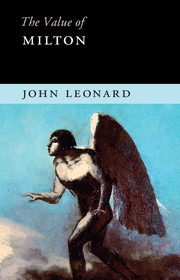Book contents
- Frontmatter
- Dedication
- Contents
- Preface
- Textual note
- 1 Areopagitica, toleration and free speech
- 2 The minor poems and ‘the power / to save’
- 3 The political prose: ‘in liberty's defence’
- 4 Paradise Lost, the sublime poem
- 5 Paradise Lost, ‘solid good’
- 6 Paradise Regained, ‘To the utmost of mere man’
- 7 Samson Agonistes, tragedy and terror
- Notes
- Index
4 - Paradise Lost, the sublime poem
Published online by Cambridge University Press: 05 July 2016
- Frontmatter
- Dedication
- Contents
- Preface
- Textual note
- 1 Areopagitica, toleration and free speech
- 2 The minor poems and ‘the power / to save’
- 3 The political prose: ‘in liberty's defence’
- 4 Paradise Lost, the sublime poem
- 5 Paradise Lost, ‘solid good’
- 6 Paradise Regained, ‘To the utmost of mere man’
- 7 Samson Agonistes, tragedy and terror
- Notes
- Index
Summary
Paradise Lost is the pre-eminent reason why Milton matters. To say this is not to depreciate his other accomplishments. Had he never written another poem after ‘Lycidas’, he would still be revered as a great poet. Had he written only prose, he would be remembered. But it is Paradise Lost that fulfils his lifelong goal to ‘leave something so written to aftertimes, as they should not willingly let it die’. Paradise Lost will never die, though it has been called ‘a monument to dead ideas’. We owe that oft-quoted line to the Victorian critic Sir Walter Raleigh. Raleigh thought the poem's ideas ‘dead’ because ‘the world is now thickly peopled with men and women who, having bestowed their patronage on other ancestors, care little about Adam and Eve’. But Raleigh did not conclude that the poem is ‘dead’: ‘Paradise Lost is not the less an eternal monument because it is a monument to dead ideas’. Intriguingly, the person who did more than anyone else to kill the poem's ‘ideas’ revered the poem. Charles Darwin wrote in his Autobiography: ‘Milton's Paradise Lost had been my chief favourite, and in my excursions during that voyage on the Beagle, when I could take only a single volume, I always chose Milton’. It may seem odd that Darwin should cherish a poem about Adam and Eve, but his appreciation of Milton was sincere and it serves as a salutary reminder of great poetry's enduring power and value. I shall return at the end of this chapter to the question of why Milton may have mattered to Darwin.
Paradise Lost should not be valued solely or even primarily for its ideas. Its chief value lies in the poetry, in how it says what it says – its power to move and delight. Many readers have tried to claim the poem for this or that interpretation – theological, philosophical, or political – and to repudiate rival views. They have sometimes resorted to name calling. Defenders of Milton's God have characterized their opponents as ‘Satanists’, while they have fired back with ‘neo-Christian’. On both sides the tacit assumption has been that only readers of a particular persuasion can truly appreciate Paradise Lost.
- Type
- Chapter
- Information
- The Value of Milton , pp. 63 - 84Publisher: Cambridge University PressPrint publication year: 2016

